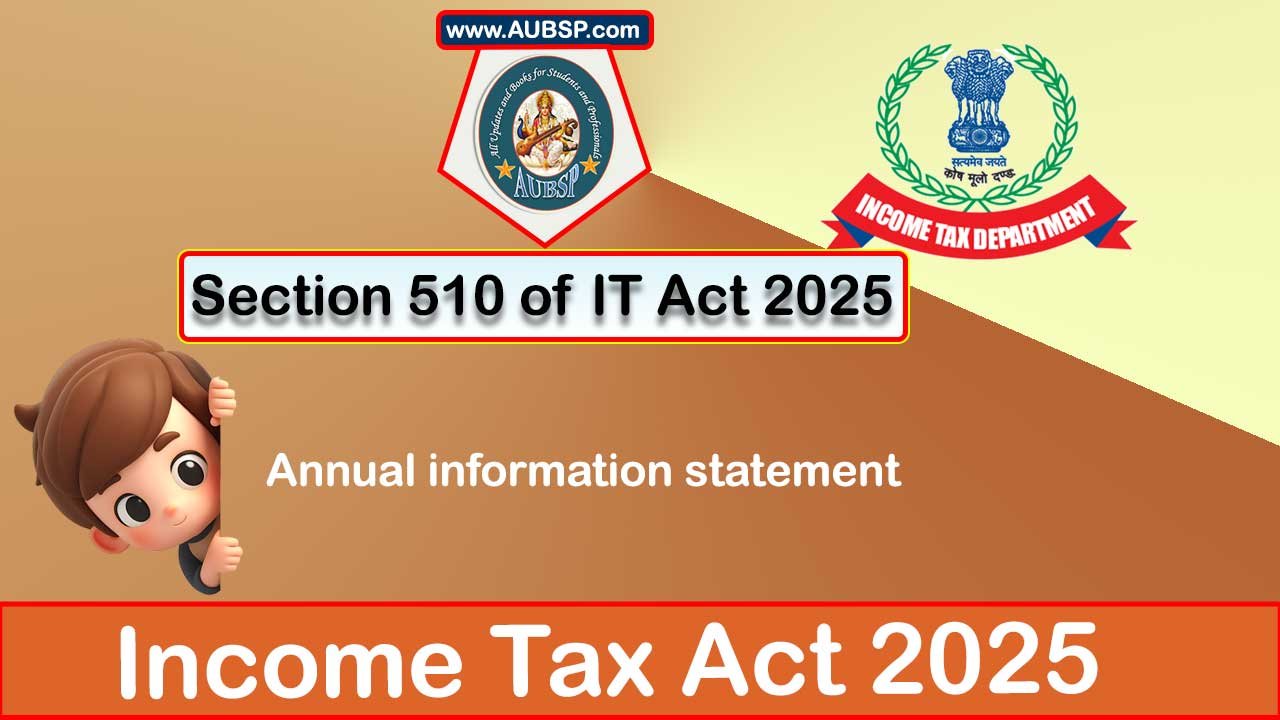Annual information statement
[As per the Income Tax Act, 2025 (this Act) w.e.f. 1st April, 2026.]
Section 510(1) of Income Tax Act 2025
510(1) The prescribed income-tax authority or the person authorised by such authority, shall upload in the registered account of the assessee an annual information statement in such form and manner, within such time and along with such information, which is in the possession of an income-tax authority, as prescribed.
Section 510(2) of Income Tax Act 2025
510(2) In sub-section (1), “registered account” means the electronic filing account registered by the assessee in the web portal, as may be designated by the prescribed income-tax authority or the person authorised by such authority.
FAQs on Annual Information Statement (AIS)
1. What is the Annual Information Statement (AIS)?
AIS is a comprehensive statement that includes details of an assessee’s financial transactions as reported by various sources such as banks, financial institutions, and other reporting entities. It helps taxpayers cross-verify income and financial transactions while filing their Income Tax Return (ITR).
2. Under which section of the Income Tax Act, 2025, is AIS introduced?
AIS is mandated under Section 510(1) of the Income Tax Act, 2025, which requires the prescribed income-tax authority to upload it in the assessee’s registered account.
3. What is meant by the “registered account” for AIS?
As per Section 510(2) of the Act, the registered account refers to the electronic filing account created by the assessee on the designated web portal of the income tax department.
4. What details are included in the AIS?
AIS includes:
- Salary and professional income details
- Interest from bank accounts and fixed deposits
- Stock market transactions
- Property transactions (sale/purchase)
- Business and professional receipts
- Foreign remittances
- Tax deducted at source (TDS) and tax collected at source (TCS)
5. How can I access my AIS?
AIS can be accessed through the official Income Tax e-filing portal by logging into the registered account.
6. When will AIS be available for taxpayers?
AIS will be uploaded by the prescribed income-tax authority within the timeframe prescribed, which is usually before the start of the tax filing season for the relevant financial year.
7. Can I correct errors in my AIS?
Yes, if you find discrepancies in AIS, you can submit feedback online through the Income Tax portal, and necessary corrections will be made by the department based on verification.
8. Is AIS different from Form 26AS?
Yes, AIS is more detailed compared to Form 26AS, which primarily provides TDS/TCS details. AIS also includes other financial transactions reported by various sources.
9. What should I do if there is a mismatch between AIS and my actual income?
You should review and reconcile your records. If any incorrect information is reported, you can submit feedback on the portal. If corrections are not made, consult a tax professional before filing your return.
10. Does AIS replace the Income Tax Return (ITR)?
No, AIS does not replace ITR. It is a statement that helps taxpayers correctly report their income while filing their ITR.
11. What happens if I ignore the details in AIS while filing my ITR?
Discrepancies between AIS and ITR may trigger scrutiny or notices from the income tax department. It is advisable to verify AIS before filing your return.
12. Is AIS applicable to all taxpayers?
Yes, AIS applies to all taxpayers, including individuals, businesses, and companies, who have reportable financial transactions.
13. Can AIS be used as proof of income?
Yes, AIS serves as a reference document to validate income sources, but it should be cross-verified with actual financial records before using it as proof.
14. Is AIS updated in real-time?
No, AIS is updated periodically based on reports received from various reporting entities.
15. Where can I get help if I have issues with my AIS?
You can contact the Income Tax helpdesk or consult a tax expert for guidance. The official tax portal also provides grievance redressal mechanisms.
The Annual Information Statement (AIS) is a crucial financial document introduced under Section 510 of the Income Tax Act, 2025, effective from April 1, 2026. It provides a comprehensive view of an assessee’s financial transactions, helping ensure transparency and accuracy in income tax filing. By accessing AIS through their registered electronic account, taxpayers can verify income details, identify discrepancies, and avoid mismatches while filing their Income Tax Return (ITR).
AIS plays a significant role in improving tax compliance and reducing errors or omissions in tax filings. Taxpayers should regularly review their AIS and report any inaccuracies to the income tax department for correction. Since discrepancies between AIS and ITR can lead to scrutiny or tax notices, it is essential to align tax filings with the information provided in AIS.
Staying informed about AIS and utilizing it effectively will help taxpayers file accurate returns, avoid penalties, and ensure hassle-free compliance with tax regulations.

